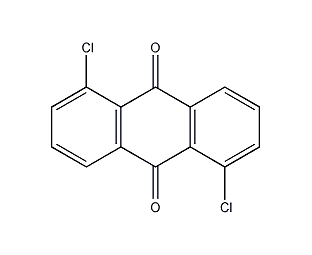
Structural formula
| Business number | 01SZ |
|---|---|
| Molecular formula | C14H6Cl2O2 |
| Molecular weight | 277.1 |
| label |
None |
Numbering system
CAS number:82-46-2
MDL number:MFCD00001190
EINECS number:201-424-0
RTECS number:CB6495000
BRN number:402592
PubChem number:24893947
Physical property data
1. Character: yellow crystal
2. Density (g/mL, 25/4?): Uncertain
3. Relative vapor density (g/mL, air =1): Uncertain
4. Melting point (ºC): 245
5. Boiling point (ºC, normal pressure): Uncertain
6. Boiling point (ºC, 5.2kPa): Uncertain
7. Refractive index: Uncertain
8. Flash point (ºC): Uncertain
9. Ratio Optical rotation (º): Uncertain
10. Autoignition point or ignition temperature (ºC): Uncertain
11. Vapor pressure (kPa, 25ºC): Uncertain
p>
12. Saturated vapor pressure (kPa, 60ºC): Uncertain
13. Heat of combustion (KJ/mol): Uncertain
14. Critical temperature (ºC ): Uncertain
15. Critical pressure (KPa): Uncertain
16. Log value of oil-water (octanol/water) partition coefficient: Uncertain
17. Explosion upper limit (%, V/V): Uncertain
18. Explosion lower limit (%, V/V): Uncertain
19. Solubility: soluble Insoluble in nitrobenzene, anisole and benzyl alcohol, insoluble in alcohol, acetic acid, benzene and toluene.
Toxicological data
Neurotoxicity: Rabbit eye test: 500 mg/24HREACTION;
Ecological data
None
Molecular structure data
1. Molar refractive index: 68.45
2. Molar volume (cm3/mol): 182.9
3. Isotonic specific volume (90.2K): 509.1
4. Surface tension (dyne/cm): 59.9
5. Polarizability (10-24cm3): 27.13
Compute chemical data
1. Reference value for hydrophobic parameter calculation (XlogP): 4.1
2. Number of hydrogen bond donors: 0
3. Number of hydrogen bond acceptors: 2
4. Number of rotatable chemical bonds: 0
5. Number of tautomers: None
6. Topological molecule polar surface area34.1
7. Number of heavy atoms: 18
8. Surface charge: 0
9. Complexity: 346
10. Number of isotope atoms: 0
11. Determine the number of atomic stereocenters: 0
12. Uncertain number of atomic stereocenters: 0
13. Determine Number of stereocenters of chemical bonds: 0
14. Number of stereocenters of uncertain chemical bonds: 0
15. Number of covalent bond units: 1
Properties and stability
None
Storage method
Stored sealed and protected from light.
Synthesis method
The chlorination method is mainly used, using sodium 1,5-anthraquinone disulfonate as raw material, adding sodium chlorate to hydrochloric acid solution for chlorination reaction, and then filtering, washing and drying it.
First add water and anthraquinone-1,5-disulfonic acid sodium salt into the reaction kettle, stir well, then add 30% hydrochloric acid, raise the temperature to 94~95ºC, and slowly add 8% chloric acid Sodium solution. After the addition is completed, test the end point. Take a sample and filter it while it is hot. The end point is that no precipitation occurs after the filtrate is cooled. Cool to below 60ºC, filter, wash until neutral, and dry to obtain 1,5-dichloroanthraquinone.
Purpose
As a dye intermediate. Used to synthesize disperse blue 2BLN.
extended-reading:https://www.bdmaee.net/cas-2273-45-2/extended-reading:https://www.bdmaee.net/efficient-trimerization-catalyst-for-aliphatic-and-alicyclic-isocyanates/extended-reading:https://www.bdmaee.net/dabco-2033-catalyst-cas1372-33-9-evonik-germany/extended-reading:https://www.newtopchem.com/archives/1677extended-reading:https://www.bdmaee.net/lupragen-n103-catalyst-dimethylbenzylamine-basf/extended-reading:https://www.cyclohexylamine.net/catalyst-pc41-catalyst-pc-41-polyurethane-catalyst-pc41/extended-reading:https://www.newtopchem.com/archives/44454extended-reading:https://www.bdmaee.net/high-efficiency-catalyst-pt303/extended-reading:https://www.bdmaee.net/wp-content/uploads/2022/08/Lupragen-DMI-gel-catalyst-Lupragen-DMI-epoxy-resin-curing-agent-Lupragen-DMI.pdfextended-reading:https://www.newtopchem.com/archives/1785

